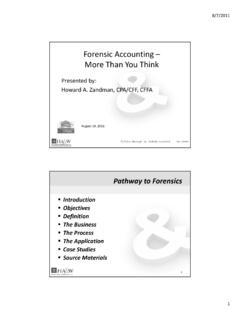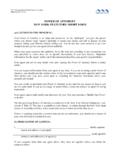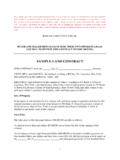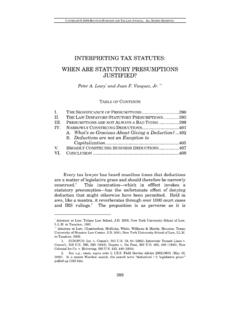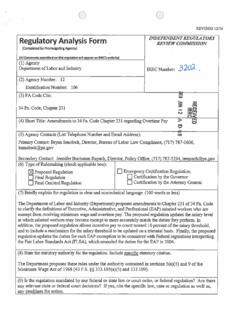Transcription of APPORTIONABLE BUSINESS INCOME INSIDE U.S. Supreme …
1 INSIDE Vol. XVI, No. 17, October 1, 2007 Michigan May Make Two SBT Assessments for Same Tax Period ..3 Pennsylvania Film Production, Agricultural Resource Credits Enacted .4 State Updates ..6 Review for Oklahoma Royalty Withholding Sought ..8 SALT CONFERENCE Vanderbilt s School of Law will host the 14th annual Paul J. Hartman State and Local Tax Forum in Nashville, Tenn., Oct. 17-19. The forum will address FIN 48 issues, attorney-client privileges, signifi cant state tax cases, re-engineering of UDITPA, disclosure of tax information, un- INCOME taxes, addback statutes, nexus, sales and use tax devel-opments, and more. The cost of the Oct. 17 afternoon Accounting for State Taxes or Sales and Use Taxes sessions are $265. The Oct. 18 and 19 SALT forum is $775 for practitioners and $675 for government representatives.
2 A $50 discount is offered for at-tendees registering for all three days. Call (615) 822-6960 or visit COMING IN FUTURE ISSUES California Franchise Tax Board Rulings Illinois Legislation APPORTIONABLE BUSINESS INCOME Supreme Court to Rule if Sale of BUSINESS Segment APPORTIONABLE The Supreme Court has granted an Ohio corporation s re-quest to decide if Illinois may require it to treat the gain from its sale of an underlying BUSINESS segment as APPORTIONABLE BUSINESS INCOME , for state corporate INCOME tax purposes, on the basis that the asset served an operational function. Meadwestvaco Corp. v. Ill. Dept. Rev., SCt, Dkt. 06-1413, cert. granted , September 25, 2007 ( Mead ). Operational INCOME Paul Frankel , a partner with Morrison & Foerster LLP , in New York, represents Mead. Frankel is pleased that the Court decided to hear the case.
3 In the 2007 CCH State Tax Advisory Board meeting, Frankel agreed that practitioners need more clarity regarding operational analysis than existing case law provides. [O]perational does not mean, It s 100% sub. Got you. That s not enough. I just had a trial in Boston and the auditor said, in effect: Well, you re a 100% sub. No further tests. Nothing on unitary, nothing on operational connection, nothing on products, nothing on short-term interest. Nothing. Just: You own it. We re going to apportion it. Richard Pomp , a professor at the University of Connecti-cut Law School , who testified on behalf of Mead, commented, This case gives the Court a chance to unbundle what is meant by operational INCOME in Allied-Signal . It cannot mean what Illinois thinks it means and I am quite confident that Mead will prevail.
4 Allied-Signal, Inc. v. Dir., Div. of Taxation , SCt, 504 US 768, 112 SCt 2251 (1992). Procedural History Since 1968, the corporation (Mead) had owned 100% of what be-came Lexis/Nexis. Lexis/Nexis changed several times between a division and a subsidiary of Mead. In 1994, Mead sold Lexis/Nexis for a gain of approximately $1 billion. Mead, which transacted BUSINESS in many states including Illinois, excluded the gain from its 1994 Illinois corporate INCOME tax return. However, the Illinois Department of Revenue issued a defi ciency notice on the basis that the gain was APPORTIONABLE BUSINESS INCOME . THIS IS COPYRIGHTED MATERIAL it is unlawful to photocopy. State INCOME Tax Alert (800) 344-37342 State INCOME Tax Alert October 1, 2007 STATE INCOME TAX ALERT (ISSN 1088-2898) is published twice-monthly by CCH, a Wolters Kluwer BUSINESS .
5 Annual subscription price: $297. Subscription inquiries should be directed to State INCOME Tax Alert, 4025 W. Peterson, Chicago, IL 60646. Telephone: (800) 344-3734. Copyright 2007 CCH. State INCOME Tax Alert is also available electronically on the Internet with a searchable back-issue archive. Call customer service at (800) 344-3734 to get a trial electronic subscription. Photocopying or reproducing in any form in whole or in part is a violation of federal copyright law and is strictly prohibited without the publisher s consent. State INCOME Tax Alert is designed to provide general information on BUSINESS taxes and not to offer legal or accounting advice. No claim is made to original govern-ment works; however, within this product or publication, the following are subject to CCH s copyright: (1) the gathering, compilation, and arrangement of such government materials; (2) the magnetic trans-lation and digital conversion of data, if applicable; (3) the historical, statutory and other notes and references; and (4) the commentary and other ADVISORY BOARDS heri Miller, Diefenbach, Managing Webster, Executive EditorTechnical ConsultantDavid E.
6 , LLM, Tax PartnerJones Day, DallasTO SUBSCRIBE:Please call(800) 344-3734 Chris M. Micheli, , Snodgrass & Micheli LLCS acramento, T. Petrik, PartnerAlston & Bird LLPA tlantaRichard D. Pomp, of LawThe University of ConnecticutHartford, P. Ryan, , State & Local TaxesApple ComputerCupertino, TatarowiczPartner, Ernst & Young LLPW ashingtonPatrick Van Tifl in, Miller Schwartz & Cohn LLPL ansing, Derdenger, , , , Steptoe & Johnson LLPP hoenixBruce P. Ely, , , SALT GroupBradley Arant Rose & White LLPB irmingham, Frankel, , , Morrison & Foerster LLPNew YorkLynn A. Gandhi, , , , Miller Canfi eldPaddock & Stone PLCD etroitJordan Goodman, , , Horwood Marcus & Berk CharteredChicagoDon Griswold, , McDermott Will & Emery LLPNew York Mead challenged the Department s action in court, asserting that its investment in and disposition of Lexis/Nexis served an invest-ment, as opposed to an operational, function and, therefore, the gain was not APPORTIONABLE .
7 The Appellate Court considered several factors in concluding that Lexis/Nexis served Mead in an operational rather than an investment function, including: Mead s capital investment in the early years of Lexis/Nexis, Mead s re-tention of various tax advantages, Mead s in-vestment of Lexis/Nexis excess cash, Mead s approval of all major capital expenditures, Mead s ability to change Lexis/Nexis from a division to a subsidiary, and Mead s descrip-tion in its annual report of Lexis/Nexis as a key BUSINESS component. Based on these fi nd-ings, the Appellate Court upheld the circuit court s conclusion that Lexis/Nexis served an operational purpose within Mead s BUSINESS operations, thereby allowing Illinois to appor-tion the gain from Mead s sale of Lexis/Nexis under Illinois statutory defi nition of BUSINESS INCOME , which incorporates the operational function test of Allied-Signal.
8 The Illinois Supreme Court denied Mead s subsequent petition for appeal, and Mead fi led this petition with the Supreme Court. Mead asserts that all of the factors relied upon by the Illinois Appellate Court derive from the fact that Mead owned 100% of Lexis/Nexis, and refl ect an ordinary relationship between a company and a 100% owned subsidiary. Supreme Court Consideration With all the state issues that have been peti-tioned to the Court, it is interesting that the Court chose to revisit an issue that they ad-dressed relatively recently. However, Jordan Goodman , a partner with Horwood Marcus & Berk Chartered in Chicago, hopes that the Court s decision to hear Mead signals that it will clarify the tests set forth in the Allied-Signal case and explain the import of establishing an operational relationship.
9 He is cautiously optimistic that there will be a good result and doesn t think that the Court would take the case just to affi rm the underlying case. Goodman goes on to suggest that it s possible that the Court took this case (rather than, perhaps, a nexus case such as FIA Card Services, fka MBNA America Bank, , v. Tax Comm r , SCt, Dkt. 06-1228, cert. denied , June 18, 2007) because Mead involves a discreet issue that cannot be legislated by Congress. The nexus issue, on the other hand, has already generated multiple attempts at legislation in the Congress. THIS IS COPYRIGHTED MATERIAL it is unlawful to photocopy. State INCOME Tax Alert (800) 344-3734 October 1, 2007 State INCOME Tax Alert 3 KEY TAKEAWAY POINTS Taxpayers are still in a position to take apportion-ment if they have gains.
10 The Constitution still protects taxpayers. Taxpayers should also take heart that the Supreme Court did take a state INCOME tax case, particularly since the Court has shown little interest in the nexus issue. There is no national movement for a declaration of what is APPORTIONABLE versus nonapportionable. This is the chance for this issue to be settled. Professor Pomp says he was surprised the Court took the case. The issue in the case is very facts-oriented but Mead s petition for cert was exceptionally well done. It sent a strong message to the Court that Illinois flaunted Allied-Signal and Woolworth . The factors the Il-linois court emphasized are common to all large corporations. Factors that describe all large cor-porations cannot serve usefully to distinguish operational INCOME from investment INCOME .
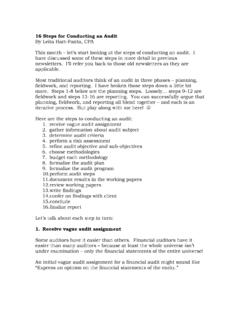


![Lease Accounting CPE slides [Read-Only]](/cache/preview/b/e/e/e/3/4/1/5/thumb-beee3415077ca108d94220e1fd63be5b.jpg)



